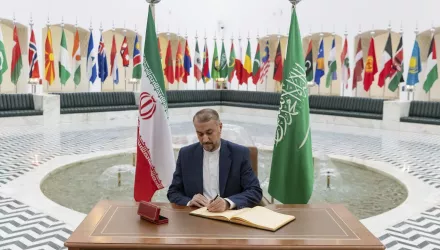BEIRUT -- One of the most annoying aspects of spending time in the United States, as I have just done with a month’s working visit there, is to follow the news coverage of Iran in the mainstream American media. Well, calling it “news” coverage is a bit of a stretch, because the mainstream American media is not really reporting news about Iran, but rather repackaged ideological attacks and threats that emanate primarily from the American and Israeli governments.
The main problem -- evident in virtually every story about Iran in the mainstream media, including the “quality” outlets like the New York Times, Washington Post, Wall Street Journaland the leading television channels -- is that the coverage is inevitably based on assumptions, fears, concerns, accusations and expectations that are almost never supported by factual and credible evidence. Two things in particular are wrong in the coverage.
First is that most media stories about Iran view the country almost uniquely through the lens of its being an adversary and a threat to the United States, Israel and Arab allies of the U.S., whether because of Iran’s alleged regional hegemonic aims or its terrorism links. Iran only exists for most American media as a threat to be beaten back at any cost.
The second is that most media analyze Iran almost exclusively through the issue of its nuclear industry. This attitude sees Iran as secretly developing a nuclear bomb that it will use to threaten or destroy neighboring powers, including Israel and Arab oil-producing countries. For the U.S. mainstream media, Iran is first and foremost a nuclear threat, and little else about the country is deemed worthy of serious coverage.
I have no doubt that any impartial assessment of the professional conduct of most American media in covering the Iran situation would find it deeply flawed and highly opinionated, to the point where I say that mainstream media coverage of Iran in the United States is professionally criminal. I base this on having learned my journalism craft and values in the United States, where quality press coverage of any issue ideally should be characterized by a combination of accuracy, balance, depth and context, within a rigorous attempt by the writer to remain impartial when reporting stories that include controversy or conflict.
These professional qualities are usually absent from news coverage of Iran in the United States, and I say this is a criminal enterprise because the consequences of the flawed and aggressive coverage helps shape a public opinion environment in which it becomes acceptable to threaten and sanction Iran on the basis of mere suspicions and fears in the minds of American and Israeli politicians -- all of whom, I would guess, have never visited Iran or even spoken to any credible or “normal” Iranian who is not involved in political lobbying in Washington, D.C. The discussion of Iran in the media over the past two years has also been full of references about the possibility of attacks against Iran by Israel or the United States, with very little if any serious analysis of whether such unilateral attacks are permissible under international law.
I am continuously amazed to see every accusation in every story about Iran’s alleged sinister and secretive nuclear bomb plans hedged with phrases like “it is assumed” or “officials believe” or “analysts suspect” or Iran “may be” or “is thought to be” or is “suspected of” doing this or that. There is no certainty, little credible proof, few verifiable facts, only anger, assumptions and fear.
This same hollow and shoddy level of evidence presented in the media’s portrayal of Iran could never be used to frame, say, the actions of young African-Americans, Hispanic teachers, or professional women bankers, because it would be ejected by both professional media standards and common human rights standards as being a bag of wild prejudices and stereotypes that are not supported by fact. The mass media gets away with disguising ideological venom as impartial news coverage in the case of Iran, though, because a different standard of professionalism is at work here, one which makes it permissible for the media to ignore its role as a reporter of facts in favor of being an ideological warrior that serves the purposes of assorted governments. We saw at great cost in Iraq what destruction, waste and criminality this sort of behavior can lead to.
It will be fascinating now to see how the media reports on possible signs of progress in the negotiations between Iran and the P5+1 countries (U.K., China, France, Russia, the United States and Germany) that resume in Kazakhstan. I hope our American journalism colleagues will summon the moral and professional strengths within them to cover both sides of these talks in their full and accurate political and technical contexts, rather than continue to act like robotic cheerleaders for the American and Israeli governments.
Rami G. Khouri is Editor-at-large of The Daily Star, and Director of the Issam Fares Institute for Public Policy and International Affairs at the American University of Beirut, in Beirut, Lebanon. You can follow him @ramikhouri.
Khouri, Rami. “Painfully Following Iran in the U.S. Media.” April 6, 2013




